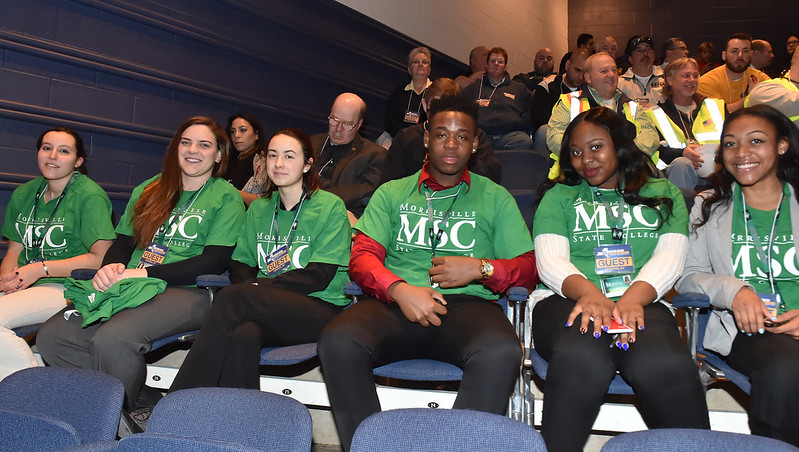
Young people are again in highly precarious positions as the economy crumbles (photo: Kevin P. Coughlin/Governor's Office)
If we have learned anything from the Great Recession just a decade ago, it’s that young adult generations that enter the labor market in an economic downturn are at a serious disadvantage, impacting their ability to successfully launch a career and reach financial security and self-sufficiency like the generations before them. Members of the Millennial generation, people who came of age during the Great Recession, make 20 percent less in wages and have a net wealth that’s half as much as their Baby Boomer parents.
Although it’s important not to pile on the fear, hysteria, and unknown brought on by the new coronavirus, COVID-19, it’s equally critical that we are diligently participating in and watchdogging how policymakers respond to the economic fallout from the global pandemic -- with nearly 10 million Americans filing for unemployment insurance in just a two-week period and nearly 60 percent of Americans fearing they will lose their jobs. This is especially true as officials at all levels of government put forward major New Deal-style investments and policy reforms that can shape what the future looks like for generations to come.
Without a radically new approach to level the playing field for today’s younger generation, the fear of generational inequality will become a reality in a post-coronavirus economy.
What is most concerning about the new economic downturn is that prior to COVID-19, the economy was not actually working for everyone, which means any efforts led by policymakers in a recovery should be careful not to focus on reverting to the pre-coronavirus status quo, which was driving greater inequality across the United States. Nine of the ten most-held jobs in the state, collectively held by 1.7 million New Yorkers, pay less than $32,000 a year, leaving many New Yorkers especially vulnerable to the immediate and long-term economic fallout wrought by the coronavirus.
Homeownership rates in New York have also steadily declined, raising questions about the financial well-being of families, especially younger families that represent the future of our state.
Unfortunately, New Yorkers largely lack the necessary skills that could attract industries with good jobs as 42 percent of New Yorkers have a high school diploma or less in school achievement. More than 2 million New Yorkers have some college credits but not a degree, likely leaving them with debt and nothing to show for it. These realities are worrisome considering that by 2027 70 percent of jobs are estimated to require some type of postsecondary education or training, and we know that the more education and training you have, the higher your earning potential is.
For young adults, prior to COVID-19, the statewide unemployment rate, those without a job but actively looking for work, was 20.7 percent for 16- to 19-year-olds and 11.6 percent for 20- to 24-year-olds, a troubling trend in the wrong direction, since we know that early work experience increases earning potential and better prepares rising generations to enter an increasingly competitive labor force. Yet career and technical education and work-based learning in the K–12 system is largely treated as a nice-to-have, even as the economy has continued to make clear it's a must have.
In New York City, a recent analysis done for JobsFirstNYC by The Community Service Society of New York found that 16 percent of 18-30-year-olds were out-of-school and out-of-work, a number likely to balloon as unemployment continues to skyrocket in the coronavirus fallout. What’s more is that younger New Yorkers are leaving in droves, while the population continues to grow older, raising questions about what New York’s economy and labor force will eventually look like.
As Annie Lowery, a reporter at The Atlantic, points out in her sobering article “The Great Affordability Crisis Breaking America,” the costs associated with college, housing, child care, and health care are rising significantly faster than wages, further hardening growing inequality across the country and especially in places with higher costs of living already, like New York.
Long story short is that despite record growth with a bullish stock market, high GDP, and low unemployment, the economy was simply not working for the majority of Americans. All of these realities provide us with a baseline understanding of the deep and growing inequalities that existed prior to the unraveling economic crisis brought on by the COVID-19 pandemic. The question is what does a post-coronavirus economy look like and how do we begin to rebuild the American Compact for rising generations?
To start, our elected leaders at every level need to adopt a new paradigm of radical equity that rebuilds the economy, and with it our approach to education and workforce development. One that is future-focused on realizing shared economic prosperity by reviving a steadily fading middle class. This new paradigm must also explicitly renew the broken promise made to rising generations who, with the economic fallout of COVID-19, will almost certainly have experienced significant disadvantages as they launch their adult life in a deep recession.
***
Kevin Stump is Senior Vice President at JobsFirstNYC and co-chair of the Invest In Skills NY coalition. On Twitter @KevinStump, @JobsFirstNYC & #InvestInSkillsNY.
***
Have an op-ed idea or submission for Gotham Gazette? Email This email address is being protected from spambots. You need JavaScript enabled to view it.




